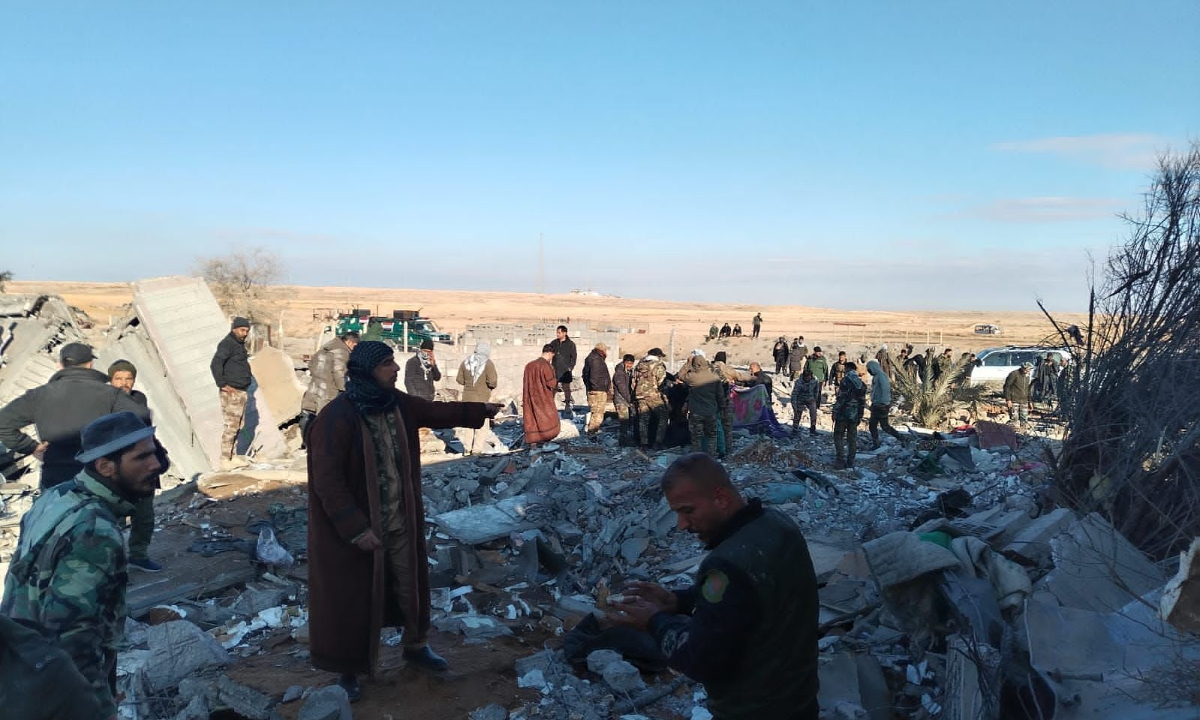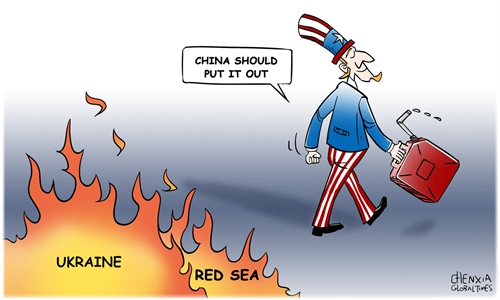US airstrikes complicate Middle East; Dilemma a consequence of hegemony, benefits military-industrial complex

Photo:VCG
US troops launched airstrikes on Friday, hitting at least 85 targets in Iraq and Syria, in retaliation of a drone attack the previous weekend that killed three US soldiers.
The US, in a dilemma of "responding without escalating the situation," is paying the price for its military-dependent path, which is a result of US hegemony and its military-industrial complex.
The US government and several media outlets tried to depict the Friday retaliation as "restrained" by emphasizing the attacks were targeted and short, and "far from the most pain the Pentagon was capable of delivering," as CNN put it.
US President Joe Biden said the targets of the Friday airstrikes were facilities used by Iran's Islamic Revolutionary Guard Corps (IRGC) and "affiliated militia." He said retaliation "will continue at a time and place of our choosing," and also reiterated that he does not seek a wider conflict in the Middle East but attacks on US troops can't go unanswered.
The US had telegraphed its response for days, with senior US officials briefing about its nature, its severity, and even hinting at its targets, according to CNN.
Engaging in excessive attacks on the militants would entangle the US further in the web of the Middle East crisis, a nightmare that the country is keen to avoid repeating. But at the same time, a feeble response would risk accusations of embarrassment and weakness on the global stage, Liu Zhongmin, a professor at the Middle East Studies Institute of Shanghai International Studies University, told the Global Times.
Liu noted the fermenting chaos across the Middle East is becoming increasingly unfavorable for Biden as the presidential election looms closer.
However, no matter how "carefully" the US attempts to act, the retaliatory attacks will accelerate the vicious circle and further complicate current Middle East tensions, said analysts.
The US' long, dominant presence in the Middle East has made itself and even the international community so accustomed to a military approach to assert so-called US leadership that the country cannot think or act alternatively in a way that can cool down the situation, they said.
The multi-spot eruption of Middle East conflicts, from the initial conflicts in the Gaza Strip to the Red Sea crisis, and the latest strikes, have caused headaches for the White House while having one beneficiary - the US military-industrial complex, Li Haidong, a professor at the China Foreign Affairs University, told the Global Times.
"The tendency of US policy to serve the military-industrial complex will not change; it is a misfortune for the country and the world," Li said.
US overseas arms sales surged 16 percent to a record $238 billion in Fiscal Year 2023, with rising demands due to major global military conflicts, according to a US State Department fact sheet released on Monday.
While gradually losing control of the Middle East, the US cannot help blaming China for any adverse situation it encounters. A New York Times article on January 26, containing statements like "China's seeming indifference to the Red Sea crisis reinforces the US' role as the world's predominant power," aimed to portray an "irresponsible" China as having to rely on the powerful US in order to safeguard its trade through the Red Sea.
The Biden administration has been making the case to Beijing that it should help quiet the Houthi attacks, US media outlet Politico reported, citing a senior US official.
Here, the US is again thinking with a hegemonic mindset, but China's view on international relations and conflicts is never pressure or coercion, analysts said.
Counting on China to pressure Iran, which the US claimed to be behind the militants, or any involved parties is an overly simplistic notion, because China is not in a position to pressure any party, said Liu.
Chinese Foreign Ministry spokesperson Wang Wenbin, when asked to comment on the deadly drone attacks on US military bases, said that "We hope relevant parties will remain calm and exercise restraint, step up dialogue and communication, avoid getting into a vicious cycle of revenge, and prevent further escalation of tensions in the region."
Analysts noted the unrest in the Middle East has mainly stemmed from the Palestinian-Israeli conflict, and a speedy end to direct conflicts in Gaza would help ease spillover tensions.
China stands ready to work with all parties to hold a more broad-based, authoritative and effective international peace conference as early as possible, formulate a concrete timetable and roadmap for the implementation of the two-state solution and support Palestine and Israel in resuming peace talks soon for the ultimate peaceful and harmonious coexistence between Palestine and Israel, and between the Arabs and Jews, Wang said on Wednesday.


